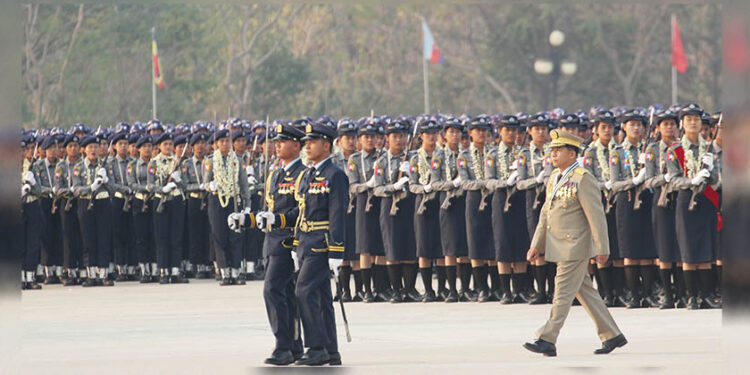NAYPYIDAW—Military spokesperson Brigadier General Zaw Min Tun said the United States’ imposition of new sanctions against Myanmar military (or Tatmadaw) chief Senior General Min Aung Hlaing and other senior leaders in connection with Rakhine issues ruins the image of the military.
The United States announced sanctions on Tuesday against Myanmar military Commander-in-Chief Min Aung Hlaing, Deputy Vice Snr-Gen Soe Win and two other senior commanders it said were responsible for the extrajudicial killings of Rohingyas in northern Rakhine State, barring them from entering the United States. The sanctions also cover the military leaders’ families.
“The leaders don’t travel to the U.S., and they need not travel there, so there are questions as to if the sanctions have impact, but it harms the dignity of the Tatmadaw,” Brig-Gen Zaw Min Tun told The Irrawaddy.
Two senior commanders, Major General Than Oo and Maj-Gen Aung Aung, were also sanctioned for leading military operations in Rakhine State.
“There are military judicial systems either in the international community or in the United States. We are acting according to the law and the judicial system, and international organizations should respect what we are doing,” said Brig-Gen Zaw Min Tun.
The U.S. announcement came on the first day of an international ministerial conference on religious freedom hosted at the U.S. State Department by U.S. Secretary of State Mike Pompeo and attended by Rohingya representatives.
In a U.S. congressional hearing in June, Congressman Bradley Sherman, chairman of the Sub-committee on Asia Pacific, proposed recognizing Myanmar’s Rakhine State as Bangladeshi territory in response to the stalemate over Rohingya repatriation.
Also in the last month, the U.S. House of Representatives’ Committee on Foreign Affairs sent the Burma United through Rigorous Military Accountability (BURMA) Act to the House of Representatives for consideration.
According to a statement from the committee, the BURMA Act seeks to stop the expansion of U.S. military assistance to Myanmar until reforms are made, and it requires reporting on crimes against humanity, including genocide—which the committee accused the Tatmadaw of committing against the Rohingya. It also calls for imposing “visa and financial restrictions on those deemed responsible for these crimes” and supports investigations into “war criminals.”
Executive director U Thein Tun Oo of the Thayninga Institute for Strategic Studies said the sanctions imposed by western governments on Myanmar during military rule were more severe than the present one.
“The sanctions are imposed on individuals and their impacts are therefore limited. It will not have an impact on the Tatmadaw overall,” he said.
The military regime managed to receive assistance from China while western governments imposed sanctions against it and, aside from China, the Myanmar military today seems to have improved ties with Russia and India, he said.
More than 730,000 Rohingya have fled Myanmar to neighboring Bangladesh since August 2017 to escape Tatmadaw operations that the UN has called a “textbook example of ethnic cleansing.” The Myanmar military denies these allegations, insisting the crackdown was a response to coordinated attacks on security posts in Rakhine State by the Arakan Rohingya Salvation Army.
“When we made responses, allegations surfaced that there were human rights abuses. We don’t neglect those allegations. We inspected with an investigation team led by a lieutenant general. Over 800 witnesses were inquired. Besides that, we made two field inspections,” said Brig-Gen Zaw Min Tun.
The United States’ sanctions were not unusual but were more severe than expected, said political analyst U Khin Zaw Win, adding that the military leaders will be in a dark place because of them.
“They may say they don’t care and they don’t want to go to America, but as the sanctions cover the military chief and his deputy, it harms the dignity [of the military]. To put it colloquially, they are listed as international villains,” he said.
The International Criminal Court (ICC) has been making attempts to conduct a full investigation into alleged crimes against the Rohingya.
Myanmar has not signed up to the ICC, but the court ruled in September that it has jurisdiction over alleged atrocities because Bangladesh—where the Rohingya are now refugees—is a member.
You may also like these stories:
Nearly 9,500 People Affected by Rakhine State Floods
U.S. Imposes Sanctions on Myanmar Commander-in-chief Over Rohingya Abuses
What the Recent Military Shake-Ups Really Mean
Flash Floods Kill Two, Intensify Suffering in Rohingya Camps

















